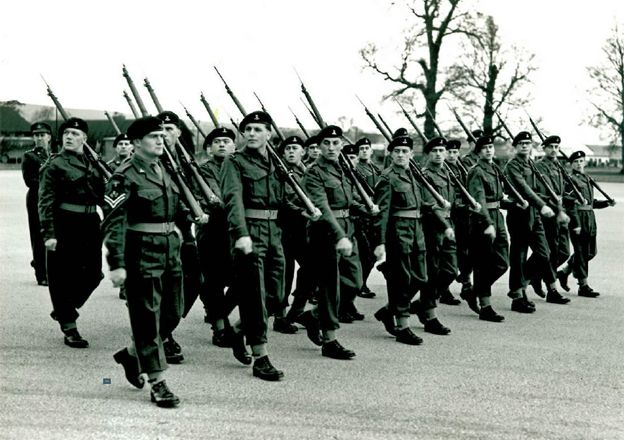Roger Brown, who is sorting though a number of diaries and accounts of National Service life in the British Army after WW2, has provided a short account of his own initial training as a young conscript in the mid-50’s. His memories of initial training very probably strike a cord with other TMT readers. If you have interesting stories of your life in the forces - please send them along to TMT so we can publish them.
In late 1956, a buff envelope marked OHMS dropped through our letterbox. My 18th birthday the previous June had made me eligible for my two years National Service, so the arrival of the envelope was not unexpected.

After attending War Office selection boards for fitness and intelligence assessments, I received formal notification that my National Service would be spent with the Royal Corps of Signals. I was to report to the Training Regiment on the 5th March 1957 in Catterick, Yorkshire. Enclosed also was a railway warrant for the journey.
Leaving my parents home early one morning( without my parents getting out of bed to say goodbye!), I travelled north with many other nervous and uncertain 18 year-olds. For us National Servicemen, the two years were divided into three parts. Basic training. Trade Training and final posting.
Arriving at Catterick we became Squad 5705 and our drill NCO’s were L/Cpl. Meadows L/Cpl. Nelson and Cpl. Cooper. They had to make soldiers out of us in four weeks. Four weeks of parades,drills, marches, P.T. and weapon training. The three NCO’s played a major part in our lives, morning, afternoon and evening, seven days a week.
Many of us had never left home before and, being in close proximity with 30 assorted Scousers, Brummies, Geordies, Taffys, Jocks and Cockneys with their different local dialects and attitudes was quite challenging.
Every day started with an early morning parade. We stood there with our boots highly polished, brasses gleaming and battle dress pressed, watched closely by the drill corporal’s as we obeyed their shouted commands.
Unfortunately I was the tallest in the squad, therefore I became, in Army parlance ‘Point Man’, and, when on parade the squad took their position from me. However, I was slightly uncoordinated with my drill movements, and had attracted the attention of the drill corporals.
For instance, failing to ‘get a grip’ of a drill, I had to experience standing in a drill shed, in front of a full length mirror, with the drill corporals on either side of me, repeatedly practising the drill whilst learning things about my parentage and my parents parentage I never knew or imagined.
When not on the drill square, our evenings were occupied by blancoing webbing, polishing brasses, bulling boots, pressing out battle dress and moaning about the Army, the food and especially our unlovable drill corporals.
The pressure to make us soldiers by the NCO’s was relentless. They had four weeks to do it before the next intake arrived, and, overall they succeeded in doing so. Sometimes they failed, and a soldier was back-squadded to the next intake. Sometimes the constant pressure caused a soldier to crack up mentally,and he was discharged as medically unfit. Sometimes, but extremely rarely, there were suicides.
However, the majority of us survived the rigours of those four weeks of basic training. We survived the early morning parades, drills, marching, P.T., Army food, foul language and the incessant shouted commands.
After our Passing Out parade as National Service soldiers and onto our trade-training, we reflected that we would never ever have to see those drill corporals again……..thank god!
Words copyright: Roger Brown

Comments on ‘We would never see them again…………….’
There is 1 comment on ‘We would never see them again…………….’
Comment by Richard Faulkner
There were some decent nco’s and have met some in my veteran’s group. The MVG.
Handpicked links